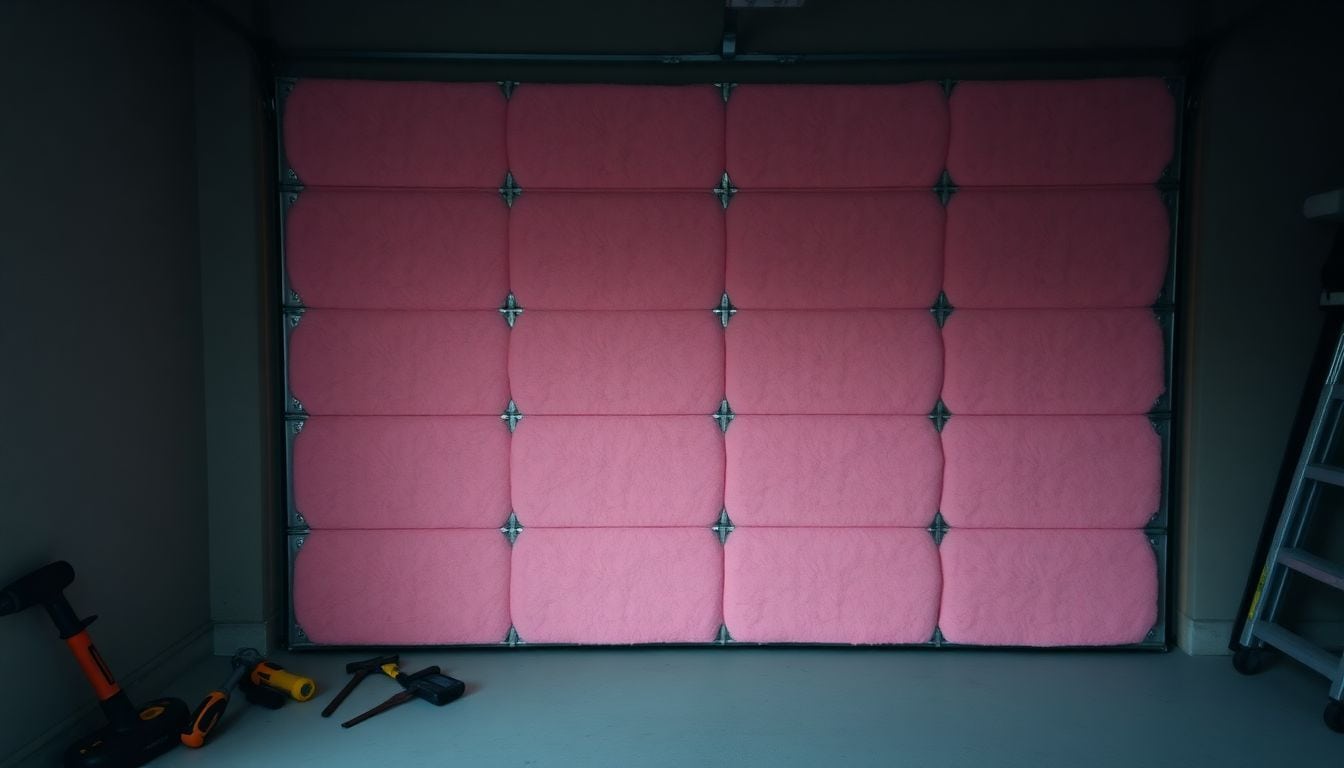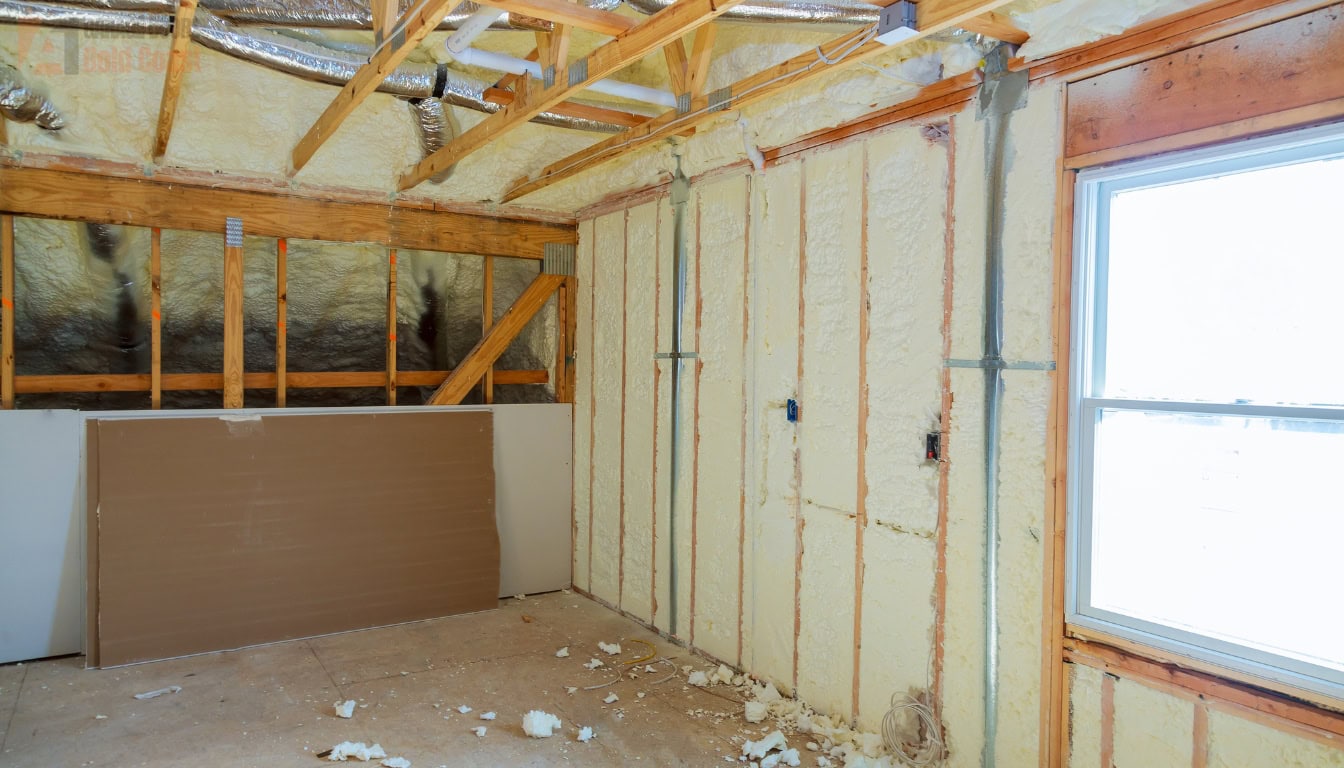Top Garage Insulation Materials for Effective Door Insulation
Is your garage too hot in summer and freezing in winter? Proper garage insulation materials can keep temperatures stable by up to 10°C. In this article, you’ll discover the best options to insulate your garage door and walls effectively.
Make your garage comfortable year-round.
Key Takeaways
- Effective Materials: Glasswool and polyester insulation offer R-values between R2.0 and R2.5, providing excellent thermal resistance for garage doors and walls.
- Cost-Effective Options: Foam insulation panels, such as foilboard kits, cost around $260 and can reduce temperature swings by up to 10°C, making them a popular choice among homeowners.
- Easy Installation: Many insulation materials like glasswool, polyester, and rigid foam are suitable for DIY installation, with kits and custom-cut panels available for a perfect fit.
- Enhanced Safety and Durability: Glasswool is fire-resistant and resists rot and vermin, while spray foam insulation adds fire-retardant properties, ensuring long-term safety and performance.
- Energy Efficiency: Proper garage insulation can lower energy costs by maintaining stable temperatures year-round, improve comfort, and increase property value.
Glasswool Insulation (Fibreglass)

Glasswool insulation, also known as fibreglass, stands out as a top choice for garage door insulation. It delivers excellent thermal performance with R-values between R2.0 and R2.5, ideal for insulating garage walls.
Installing glasswool is straightforward, especially with insulation kits available at Bunnings. This material is cost-effective and offers fire-resistant properties, enhancing garage safety.
Brands like Earthwool and Pink Batts (Fletcher) are trusted options that ensure durability. Furthermore, glasswool resists rot and deters vermin, making it a reliable solution for long-term insulation needs.
Glasswool insulation is a practical solution for maintaining a comfortable garage environment year-round.
Polyester Insulation
Polyester insulation offers a safe and effective solution for garage insulation needs. It is non-flammable and suitable for individuals with asthma and allergies, ensuring a healthier environment.
With recommended R-values of R2.0 or R2.5 for garage walls, polyester insulation provides excellent thermal resistance. Brands like Earthwool and Pink Batts (Fletcher) deliver high-quality polyester products that are easy to install.
The slimline design of polyester insulation panels makes them ideal for garages with limited space, while their moisture-resistant properties prevent condensation and maintain long-term performance.
By choosing polyester insulation, you can effectively insulate your garage walls and improve energy conservation.
Polyester insulation integrates seamlessly with various garage door insulation kits, including foilboard® garage door options. Its lightweight nature simplifies the installation process, allowing DIY enthusiasts to insulate their garage doors without professional assistance.
These insulation panels not only enhance thermal efficiency but also offer acoustic insulation, reducing noise levels inside the garage. With an R-value that meets the recommended standards, polyester insulation ensures efficient energy use throughout the year.
Moreover, it resists sagging and compression, maintaining its effectiveness over time. Selecting polyester insulation panels contributes to the overall comfort and energy efficiency of your garage space, setting the stage for exploring foam insulation panels next.
Foam Insulation Panels
Foam insulation panels offer an excellent solution for insulating your garage door. Made from polystyrene or expanded polystyrene, these panels provide high R-value thermal resistance, effectively reducing heat transfer and keeping your garage comfortable.
Polystyrene panels can lower temperature fluctuations by up to 10°C, ensuring your garage remains insulated against extreme weather conditions.
The foilboard® garage door insulation kit costs around $260.00 and includes up to four custom panel sizes per double door kit. With 294 positive reviews, it stands out as a trusted choice for homeowners.
A 10-year warranty guarantees thermal performance stability, making it a reliable insulation product. Installation is straightforward, making it suitable for DIY enthusiasts. Rigid foam insulation and Reflectix sheets are also popular options, offering versatility and durability for various garage setups.
Spray Foam Insulation
Transitioning from foam insulation panels, spray foam insulation offers a superior airtight seal for garages. It boasts a high R-value, which means it effectively resists heat flow, keeping your garage comfortable year-round.
This type of insulation reduces energy costs by maintaining temperature control inside the garage. Installing spray foam insulation helps insulate the garage walls and ceiling efficiently, making it an excellent choice for both heated and unheated spaces.
Spray foam insulation provides unmatched thermal performance, ensuring long-term energy savings.
Its application is straightforward for DIY enthusiasts, using adhesive spray systems that bond directly to surfaces. Although not mandatory for unheated garages, spray foam enhances thermal and acoustic insulation, making your garage a more versatile space.
With its fire-retardant properties, it also adds a layer of safety to your metal garage doors. Choosing spray foam insulation can significantly improve the insulation effectiveness and performance of your garage.
Rigid Foam Insulation
Rigid foam insulation provides excellent thermal resistance, keeping your garage door work well-insulated against extreme temperatures. With a high R-value, these panels effectively reduce heat transfer, enhancing energy efficiency.
Polystyrene panels, a common type of rigid foam insulation, offer an R1.1 rating at a 40mm thickness, making them a reliable choice for maintaining a comfortable garage environment.
They are also affordable, allowing homeowners to insulate their garages without significant expenses. Custom-cut options are available, ensuring that the panels fit perfectly on various garage door sizes and shapes.
Installing rigid foam insulation is a practical DIY activity that can significantly improve your garage’s insulation performance. These panels are easy to attach using insulation tape and appropriate fasteners, making the installation process straightforward.
Rigid foam insulation is fire retardant, adding an extra layer of safety to your garage space. Moreover it contributes to noise reduction, creating a quieter and more pleasant environment.
Whether you have a single or double garage, rigid foam insulation panels can be adapted to meet your specific needs, ensuring your garage remains comfortable and energy-efficient all year round.
Supplementary insights on Garage Insulation
Proper garage insulation enhances energy efficiency and provides straightforward DIY tips to improve your space’s comfort and functionality. Discover more insights now.
Benefits of Proper Garage Insulation
Proper garage insulation enhances comfort by maintaining consistent temperatures year-round. Insulating the walls and garage door panels reduces heat loss in winter and keeps the space cooler in summer.
Using foilboard garage door insulation kits can lower energy costs by minimising the need for heating and cooling. Reduced condensation and mould growth create a healthier environment, protecting stored items and the structure itself.
Well-insulated garages can also increase property value, making your home more attractive to buyers.
Installation Tips for DIY Enthusiasts
Installing garage door insulation can save money and improve comfort. Follow these tips to ensure a smooth installation process.
- Use Protective Gear: Wear gloves when handling and fitting insulation panels to protect your hands from fibres and sharp edges.
- Efficient Panel Placement: Slide panels into or behind the door flanges carefully. The entire installation typically takes less than an hour.
- Seal Gaps Properly: Avoid using adhesive. Instead, apply a long-life flexible MS Polymer to seal any gaps, enhancing thermal insulation.
- Custom Fit Panels: Choose custom panel sizes from up to four options per double door kit. Make panels 1-2mm undersized for a snug and effective fit.
- Accurate Measurements: Measure your garage door accurately to determine the correct amount of insulation needed, ensuring full coverage.
- Essential Tools: Keep a knife handy for trimming panels to fit precisely around edges and obstacles.
- Prepare the Surface: Ensure the garage door is clean and free from debris before starting the installation to promote better adhesion and fit.
- Follow Instructions: Adhere to the manufacturer’s guidelines for installing insulation panels to maximise R-value and overall effectiveness.
- Insulate Around Windows: Properly insulate around any windows to maintain consistent thermal resistance throughout the garage.
- Consider Climate Needs: Choose the best insulation type based on your local climate, whether you’re in Melbourne, Brisbane, Sydney, or Perth, to achieve optimal performance.
Choosing the Best Garage Insulation Material
Choosing the best garage insulation material involves evaluating factors like R-value, cost, and ease of installation. Rigid foam insulation delivers high R-values, cutting temperature swings by up to 10°C.
Fibreglass remains a top choice for its affordability and suitability for DIY projects. Spray foam provides excellent thermal resistance and seals gaps effectively, ensuring robust insulation.
Cellulose offers an eco-friendly alternative with strong insulation properties. Polystyrene garage door insulation panels enhance door insulation, maintaining a stable garage climate.
With a 92% customer satisfaction rate from 294 reviews, these insulation types prove effective for various needs. Select the material that best fits your garage size and insulation requirements to achieve optimal performance.
Maintenance and Long-Term Performance
Regular maintenance ensures your garage insulation remains effective year after year. Inspect insulation panels on garage walls and ceilings for any signs of wear or gaps. Use long-life flexible MS Polymer to seal any openings, which enhances thermal resistance without the need for adhesives.
This simple upkeep helps maintain the excellent insulation performance of your garage doors and walls.
M grade polystyrene panels provide stable thermal conductance, maintaining an R-value of 0.035 W/m.K over decades. These Australian-made sheets contain fire retardants, increasing safety and compliance with building standards.
With a 10-year warranty, rigid foam insulation guarantees long-term performance, making it a reliable choice for insulating your garage all year round.
Recommended Garage Accessories for Enhanced Insulation
Proper maintenance ensures insulation materials perform well. Enhancing your garage’s insulation further can increase comfort and efficiency.
Recommended Garage Accessories for Enhanced Insulation
- Insulated Garage Door Panels
Upgrade to insulated panels for better thermal resistance. Standard double garage doors include 16-20 panels, each weighing around 7kg. Choose foam insulation or Reflectix sheets for effective insulation. - Weather Stripping Kits
Seal gaps around the garage door to prevent draughts. These kits are easy to install and help insulate the walls. They also improve the overall R-value of your garage. - Insulation Blankets
Use insulation blankets on garage doors during extreme weather. They reflect heat and cold, keeping the garage temperature stable. These blankets are slimline and easy to handle. - Water-Based Paints
Paint insulated panels with water-based paints for a clean finish. Water-based options are safe and easy to apply. Custom-cut your panels to fit the exact width, height, and thickness of your garage door. - Custom-Cut Insulation Panels
Obtain insulation panels suitable for your garage’s size. Custom-cut panels ensure a perfect fit and maximise insulation effectiveness. This approach supports better thermal conductance and resistance. - Safety Gloves
Wear gloves when handling insulation materials. Gloves protect your hands from irritation and ensure safe installation of panels. They are essential for DIY enthusiasts. - Reflective Foil Insulation
Install foilboard or Reflectix insulation in walls and doors. Reflective foil enhances thermal resistance and reduces energy loss. These materials are commonly used for their slim profile and high performance. - Insulated Garage Storage Systems
Choose storage systems with built-in insulation. These units help maintain a consistent garage temperature and protect stored items from temperature fluctuations. - Ventilation Covers
Fit insulated ventilation covers to regulate airflow in the garage. Proper ventilation supports insulation by maintaining air quality and preventing moisture buildup. - Garage Door Trim Kits
Add trim kits around the garage door to improve the seal. Trim kits help block draughts and enhance the insulation of your garage door. They are easy to install and provide a neat finish.
Conclusion
Choosing the right insulation boosts your garage’s energy efficiency. Materials like glasswool and foam panels provide excellent thermal protection. Installing insulation yourself can save money and improve comfort.
Keep your insulation in good shape to ensure it works well for years. Enhance your garage today with the best insulation for lasting benefits.
FAQs
1. What are the best types of garage insulation for effective door insulation?
The best types of garage door insulation include rigid foam insulation, foilboard insulation, glass wool, cellulose insulation, and polyisocyanurate. These materials offer high R-values and are commonly used for insulating garage doors and walls.
2. How can I insulate my garage door effectively?
To insulate your garage door, use rigid foam insulation or Reflectix. These insulation panels are slimline and fit well on panel garage doors. A garage door kit often contains everything needed to install the insulation, making it a do-it-yourself project.
3. What is the importance of R-value in garage insulation?
R-value measures the insulation’s ability to resist heat flow. Higher R-values mean better insulation. Choosing materials with a high R-value, such as polyisocyanurate or foam board, ensures your garage stays warm in winter and cool in summer.
4. Can I install insulation myself, and what materials are best for DIY?
Yes, you can install insulation yourself. Commonly used types for DIY include fibreglass wool, foilboard panels, and foam boards. These materials are easy to handle and install, providing effective insulation for your garage walls and doors.
5. How does insulation improve the comfort of my garage?
Insulation makes the garage more comfortable by regulating temperature. It helps maintain a stable environment by reducing heat loss in winter and keeping the space cooler in summer. This is especially important if you use a garage heater or turn your garage into a workspace.
6. What factors should I consider when choosing insulation for my garage?
Consider the size of your garage, the type of insulation material, R-value, ease of installation, and whether the garage is attached to your home. Also, think about the insulation for the door, walls, roof, and garage floor to ensure comprehensive coverage and maximum efficiency.
Expert Garage Door Repair Solutions
Contact Reece at (07) 5515 0277 for expert garage door repairs. Visit us today for fast and reliable assistance you can count on!


